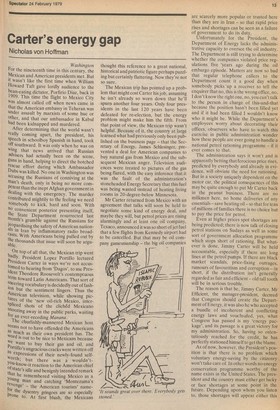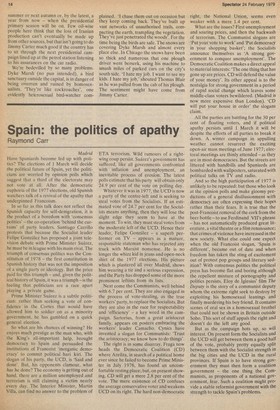Carter's energy gap
Nicholas von Hoffman
Washington For the nineteenth time in this century, the Mexican and American presidents met. But it wasn't like the first time when William Howard Taft gave lordly audience to the bean-eating dictator, Porfirio Diaz, back in 1909. This time the flight to Mexico City was almost called off when news came in that the American embassy in Teheran was under assault by marxists of some hue or Other, and that our ambassador in Kabul had been kidnapped and murdered.
After determining that the world wasn't really coming apart, the president, his Speech in schoolboy Spanish in hand, took off southward. It was only when he was on Wing that news arrived that Russian advisers had actually been on the scene, guns in hand, helping to direct the botched rescue effort during which Ambassador Dubs was killed. No one in Washington was accusing the Russians of conniving at the man's death, only in being no more comPetent than the inept Afghan government in dealing with the emergency. The murder contributed mightily to the feeling we need somebody to kick, hard and soon. With no convenient posterior presenting itself, the State Department resurrected last month's grumble against the Russians for Jeopardising the safety of American nation als in Iran by inflammatory radio broadcasts. With Americans being pulled out by the thousands that issue will soon be argu able.
On top of all that, the Mexican trip went badly. President Lopez Portillo lectured President Carter in ways we're not accustomed to hearing from `Dagos', to use President Theodore Roosevelt's contemptuous term toward Latin Americans. That sort of sneering vocabulary is decidedly out of fashion but the sentiment lingers. Thus the American television, while showing pictures of the 'new oil-rich Mexico, interspliced shots of the clich6d Mexicano snoozing away in the public parks, waiting for an ever-receding Manana. The churlishly-mannered Mexican host seems not to have offended the Americans as much as their own president has. The Word is out to be nice to Mexicans because we want to buy their gas and oil, and Fortino's ungracious cracks were written off as expressions of their newly-found selfworth; but there was a wouldn'tYou-know-it reaction to the American chief Of state's idle and benignly intended remark that he remembered visiting Mexico as a Young man and catching 'Montezuma's revenge — the American tourists' name!0r the dysentry gringoes are so especially Prone to. At first blush, the Mexicans thought this reference to a great national, historical and patriotic figure perhaps puzzling but certainly flattering. Now they're not so sure.
The Mexican trip has pointed up a problem that might cost Carter his job, assuming he isn't already so worn down that he'll spurn another four years. Only four presidents in the last 120 years have been defeated for re-election, but the energy problem might make him the fifth. From that point of view, the Mexican trip wasn't helpful. Because of it, the country at large learned what had previously only been published on the business page — that the Secretary of Energy, James Schlesinger, prevented a deal for American companies to buy natural gas from Mexico and the subsequent Mexican anger. Television audiences were treated to pictures of the gas being flared, with the easy inference that it was the fault of the administration's stoneheaded Energy Secretary that this fuel was being wasted instead of heating living rooms in 20-degree-below Minnesota.
Mr Carter returned from Mexico with an agreement that talks will soon be held to negotiate some kind of energy deal, and maybe they will, but petrol prices are rising alarmingly and at least one oil company, Texaco, announced it was so short of jet fuel that a few flights from Kennedy airport had to be cancelled. But that may be oil company gamesmanship — the big oil companies are scarcely more popular or trusted here than they are in Iran — so that rapid price rises and shortages can be seen as a failure of government to do its duty.
Unfortunately for the President, the Department of Energy lacks the adminis trative capacity to oversee the oil industry.
The Department is still trying to determine whether the companies violated price reg ulations five 'years ago during the oil embargo episode. Matters are now so bad that regular telephone callers to the Department count it a good day when somebody picks 'up a receiver to tell the enquirer that no, this is the wrong office, no, I don't know the right one, no, you can't talk to the person in charge of this-and-that because the position hasn't been filled yet and if it had been filled I wouldn't know who it might be. While the Department's employees worry about decorating their offices, observers who have to watch this exercise in public administration wonder how these people are ever going to handle a national petrol rationing programme — if it ever comes to that.
The administration says it won't and is apparently betting that ferocious price rises, predicted by everybody and already in evidence, will obviate the need for rationing. But in a society uniquely dependent on the motor car, the political consequences of this may be quite enough to put Mr Carter back in the peanut business. There are no milkmen here, no home deliveries of any essentials — save heating oil — so that for tens of millions of families there is no choice but to pay the price for petrol.
Even at higher prices spot shortages are being predicted; there is now talk of closing petrol stations on Sudays as well as some sort of government allocation programme which stops short of rationing. But whatever is done, Jimmy Carter will be held accountable, especially if there are long lines at the petrol pumps. If there are black market scandals, price-fixing outrages, rumours of favouritism and corruption — in short, if the distribution isn't generally regarded as fair and efficient — old tall tooth will be in serious trouble.
The reason is that he, Jimmy Carter, Mr Efficient, the manager-president, decreed that Congress should create the Department of Energy, it was also he who accepted a bundle of incoherent and conflicting energy laws and vouchsafed, yes, what Congress has passed is my 'energy package', and its passage is a great victory for my administration. So, having so ostentatiously reached for the credit, he has perfectly stationed himself to get the blame.
As of now, however, the President's position is that there is no problem which voluntary energy-saving by the citizenry won't take care of. In other words no energy conservation programme worthy of the name exists in the United States. The president and the country must either get lucky or face shortages at some point in the future. Depending upon whom you listen to, those shortages will appear either this summer or next autumn or, by the latest, a year from now — when the presidential primary season will be on. Few oil-wise people here think that the loss of Iranian production can't eventually be made up from other sources, but that isn't going to do Jimmy Carter much good if the country has to sit through the next presidential campaign lined up at the petrol station listening to his assurances on the car radio.
We're bedevilled by so many problems. Dyke Marsh (no pun intended), a bird sanctuary outside the capital, is in danger of being overrun and ruined by homosexualists. 'They're like cockroaches', one evidently heterosexual bird-watcher corn plained. 'I chase them out on occasion but they keep coming back. They've built up vast networks of unauthorised trails, compacting the earth, trampling the vegetation. They've just penetrated the woods'. For the time being the birds are safe. The snows are covering Dyke Marsh and almost every place else. In Chicago the snows have been so thick and numerous that one plough driver went berserk, using his machine to smash miles of parked cars on the city's south side. 'I hate my job. I want to see my kids. I hate my job,' shouted Thomas Blair as he was pulled from the cab of his plough. The sentiment might have come from Jimmy Carter.



































 Previous page
Previous page